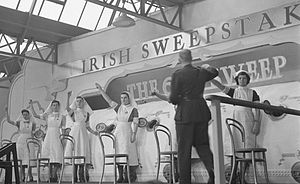Sweepstakes (lottery)
Sweepstakes (or singular: Sweepstake , older also French Poule ) are a lottery-like game of chance that is very popular in Great Britain in connection with horse races , especially the Grand National . In the run-up to this race, the BBC and many newspapers are offering the necessary files to download so that it is possible for the players to organize this lottery with their work colleagues or friends.
Origin and explanation of the name
Originally a horse race was called a sweepstake (s) , in which the owners of the horses paid the entry fees into a pot, from which the prizes for the successful horses were then paid. In the simplest case, if there was only one prize (the winner takes all ), the winner pocketed all stakes (English to sweep the stakes ). The term sweepstakes can therefore also be found in the name of many races - not just horse races - e.g. B. All Alaska Sweepstakes ; the Indianapolis 500 used to be called International 500-Mile Sweepstakes etc.
Game flow
The names of the 40 horses starting at the Grand National are written on pieces of paper, lots , these pieces of paper are then mixed and placed in a hat. Before the start of the drawing, each participant pays the agreed price for a horse (usually £ 1 to £ 5), the sum of the stakes forms the prize pool ( pot, pool ). Once the participants have placed their bets, the drawing begins. Each participant then draws a lot; the organizer enters in a list which horse was pulled by whom.
After the race, the pool is divided up, the following division is common:
- The owner of the lot with the name of the horse placed first receives 60%;
- the owner of the lot with the name of the horse placed second receives 25%;
- the owner of the lot with the name of the third placed horse receives 10%;
- the owner of the lot with the name of the horse placed fourth receives 5%.
If two or more horses cross the finish line at the same time - this is called a dead race or an ex-aequo placement - the winnings are divided accordingly: Assuming two horses run second across the finish line at the same time, they jointly take second and third place and together get 25% + 10% = 35% of the pot, i.e. H. each of the two receives 17.5%.
additions
It is of course important that all participants place their bets in full before the start of the drawing; after the start of the drawing it is no longer possible to take part in the game.
If a horse that no one has drawn wins a prize, the corresponding part of the pot is donated to a charity - or you proceed in such a way that you simply delete all horses that have not been drawn from the ranking and only look at the order of the drawn horses.
With a smaller number of participants, a player can also be allowed to buy more than one horse.
If more players want to take part than horses go to the start, then in addition to the lots with the names of the starters, empty pieces of paper ( rivets ) are placed in the hat in the appropriate number.
Sweepstakes in the form described here are a pure game of chance in which all participants have the same chances - expert knowledge regarding the chances of the individual horses is neither necessary, nor can a player improve his chances through expert knowledge.
Irish Hospital's Sweepstake
The Irish Hospitals' Sweepstake or Irish Sweepstake for short was a very popular lottery in Ireland and the Irish community in the USA from 1930 to 1987 based on this game system.
Calcutta Sweepstake
A further development of this game idea is the Calcutta Sweepstake , in which the tickets with the names of the horses are auctioned after the drawing. While sports knowledge is of no importance in the original form of the game, with a Calcutta Sweepstake it is very important to be able to assess the chances of the individual horses well, in addition, when submitting a bid, one also has to estimate the expected total amount as well as possible.
